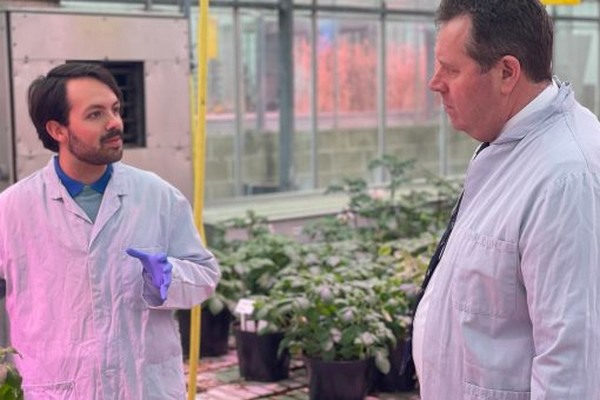The Rt Hon Mark Spencer MP, Food and Farming Minister at the Department of Environment, Food and Rural Affairs (Defra), visited Norwich Research Park to see how technologies such as gene editing can help farmers to grow more nutritious, disease-resistant, and environmentally sustainable crops.
The Minister spoke to researchers at the John Innes Centre and The Sainsbury Laboratory on a trip to Norfolk. The Tuesday, 6 February visit included the Crop Transformation Unit at the John Innes Centre, where senior scientist Dr Penny Hundleby explained the laboratory techniques and expertise that enable precision breeding technologies, such as gene-editing.

The Minister, who comes from a farming background, also spoke to Dr Emmanuel Solomon, a postdoctoral scientist at the John Innes Centre, who explained how precision breeding was helping to develop varieties of oilseed rape resistant to the devastating pest cabbage stem flea beetle.
Mr Spencer, who is MP for Sherwood in Nottinghamshire, also met researchers Thomas Navarro and Dr Jie Li, who introduced their work on potato and tomato crops. The group viewed a variety of potatoes with enhanced processing, storage and distribution qualities, and a variety that is more amenable to precision breeding of beneficial traits.
Dr Li explained research to develop gene-edited tomatoes fortified with vitamin D, which could provide a much-needed plant-based source to the many people in the UK and abroad who lack the sunshine vitamin.
The tour included a meeting with members of The Sainsbury Laboratory, where Dr. Agnieszka Witek and Professor Jonathan Jones explained exciting developments in precision breeding potato plants with resistance to late blight disease.
Director of the John Innes Centre, Professor Graham Moore, and Dr. Simon Griffiths, who leads the Delivering Sustainable Wheat program, provided an overview of the John Innes Centre’s world-leading research.
The Minister’s visit comes as the Food Standards Agency (FSA) and Defra are developing new secondary legislation governing precision-bred organisms (PBOs) and how these are assessed for safe consumption.
Dr Eva Gordon-Sharpe, Head of Strategic Engagement at the John Innes Centre, said: “The Minister was very engaged, and we were pleased to see his commitment to ensuring that legislative progress will make precision breeding work for the benefit of food producers, consumers, and the environment.”
Source: jic.ac.uk
